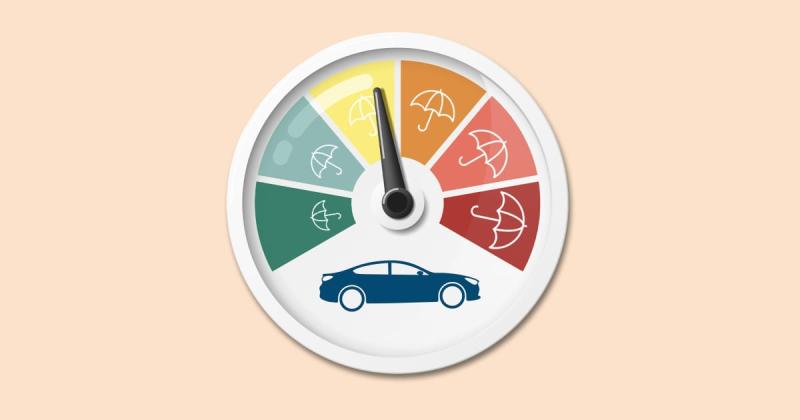Your credit score, which shows how responsible you are with money, affects more than just your capability to get loans and credit cards. It’s also a big part of how much your insurance costs. This article will discuss the often-overlooked link between credit scores and insurance.
You can save a lot of money on different types of insurance if you understand this link and take steps to control and improve your credit score. We will talk about how your credit score can affect your insurance prices and what you can do to get better insurance rates.
Understanding Credit Scores
Credit scores show how creditworthy a person is, how responsible they are with money, and how much of a risk they are to lenders and other financial institutions. The following factors are taken into account by a complicated formula that gives these scores:
- Payment History: Your track record of ensuring timely payments on credit accounts containing credit cards, loans, and mortgages.
- Credit Utilization: The section of your available credit that you are currently utilizing. Most of the time, a lower usage ratio is better for your credit score.
- Length of Credit History: Average age of your credit accounts. Your credit score can increase if you have a more extended credit history.
- Types of Credit: You have different credit accounts, such as store accounts, credit cards, and installment loans.
- Recent Credit Inquiries: This is the number of times you’ve recently tried to get new credit. If there are many questions in a short time, a bad outcome can happen.
Credit scores usually fall between 300 and 850, with higher numbers meaning you are more likely to pay your bills on time. Usually, a credit score above 700 means good credit, and a score above 750 means excellent credit. It is essential to know how these things affect your credit score if you want to keep your money in order.
The Link Between Credit Scores And Insurance Rates
There is a link between credit scores and insurance rates based on scientific data that insurance companies have examined over the years. It has been shown that people with better credit tend to file fewer insurance claims, and when they do, the claims are usually less expensive. People with lower credit scores, on the other hand, are generally more likely to file claims, and those claims tend to result in bigger payouts.
Insurance companies use this information when setting payment rates to figure out how risky something is. They may charge higher fees to people with lower credit scores because they think those people are more likely to file claims in the future. Credit scores are one of several things used to set rates for car, home, and renters insurance, which is where this happens most often.
It is important to remember that credit scores can affect insurance rates, but they are not the only thing that matters. Other things are also essential when figuring out your rates, like your driving record for car insurance or the state of your home for renters insurance.
Factors Impacting Insurance Rates
Even though credit scores are used to figure out insurance rates, they are only one part of the problem. There are a few other things that matter, and their importance can change based on the type of insurance:
- Auto Insurance: Your driving record, the make and model of your car, where you live, and the amount of coverage you choose all affect your rates, along with your credit score.
- Home Insurance: When you’re shopping for home insurance, it’s essential to think about your home’s age and health, its location (including how close it is to fire stations and flood zones), your claims history, and the types of coverage you want.
- Renters Insurance: Your rates for renters insurance can be affected by where you live, how much coverage you need, and whether or not your landlord offers combined plans.
You should know how these affect your insurance rates and how they work together. An insurance company agent can help you navigate the complicated process and find the best coverage at the best prices.
Improving Your Credit Score For Better Rates
Getting your credit score higher is an active step that can help you get better insurance rates and save money in the long run. Here are some ideas to think about:
- Pay your bills on time: Always pay your credit card, loan, and mortgage bills on time.
- Reduce Credit Card Balances: Reduce credit card credits to less than 30% of your credit lines. High credit utilization can hurt your score.
- Prevent Opening Too Many New Accounts: Every new credit inquiry you make might momentarily reduce your score. Only start a lot of new credit accounts in a short amount of time.
- Regularly Review Your Credit Reports: If you want to check your credit record for mistakes, get free copies from all three major credit companies. Any errors should be reported so they can be fixed.
- Maintain a Variety of Credit Types: Various credit accounts, such as installment loans, credit cards, and store accounts, can help your credit score.
- Take Your Time: Improving your credit score takes time, so be patient and steady in your work.
Focusing on these tips can help you improve your reputation, leading to lower insurance costs and more stable finances.
Conclusion
Regarding different types of insurance, credit score is a big part of figuring out the rates. If you understand this link and work to improve your reputation, you can get lower rates and other long-term financial rewards. Maintaining good credit will not only help you save money on insurance, but it will also improve your general economic health.
